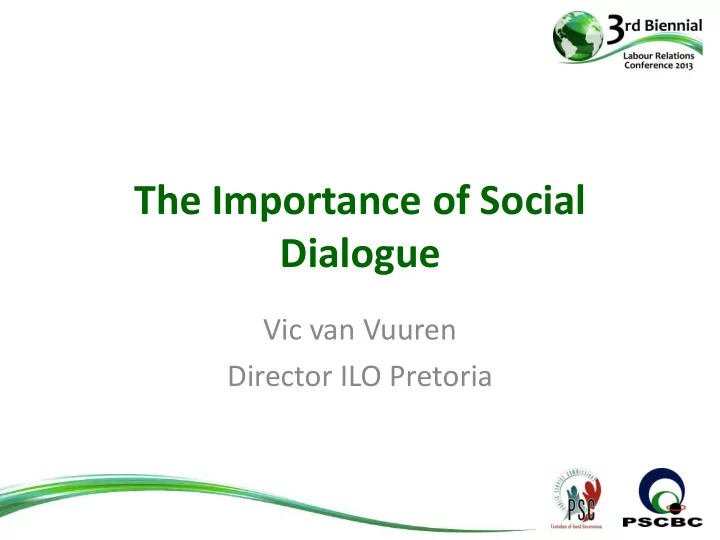

The Importance of Social Dialogue Vic van Vuuren Director ILO Pretoria
ILO • ILO Started 1919 • First specialised unit of the UN in 1946 • Only tripartite UN agency – Role of the trade unions at international and regional level • Dual role of ILO – International Standards through Conventions and Recommendations – Development
ILO • Jointly shape policies and programmes – Promoting rights at work – Encouraging decent employment opportunities – Enhancing social protection – Strengthening social dialogue
ILO – ILO not solely concerned with international industrial relations but has included the protection of fundamental human rights as one of its objectives
Global Considerations • SA not unique in experiencing protest actions both at workplace and in community • Greece, Spain, Portugal • Arab Spring • 250 million people unemployed worldwide • 75 million youth unemployed • 250 million youth earning less than $1,25 per day
Developing economies • Need to remember that they are indeed developing economies and strategies of developed economies cannot simply be replicated • Poverty levels remain high – huge social deficits • High unemployment particularly amongst youth • Not able to close the gini coefficient
South Africa vs Other Developing Economies • Disadvantage – legacy of apartheid • Advantage – entrenched social dialogue • However driving old industrial relations model
South Africa Social Dialogue 1994
International Social Dialogue 2013
South Africa Social Dialogue 1994
SA Labour Market • Successes: – Transition in 1994 peaceful – Constitution world best practice – Political, economic and labour market deals – Institutionalisation of social dialogue • NEDLAC – Creation/improvement of bargaining councils and systems – Good dispute resolution mechanisms • CCMA
SA Labour Market • Successes: – Creativity – e.g. Community involvement – New labour laws – Leadership levels high – Move from positional bargaining to integrative bargaining – Successful management of conflict
2013 SA Labour Market • Social dialogue not working: • Levels of conflict at all levels is continually rising at national, provincial and industry level • Recognised institutions are developing internal leadership and capacity challenges • Confidence in existing structures waning • Inability to close deals without losses • Positional bargaining • Poor employer – worker relationships
SA Labour Market • Challenges – NEDLAC not a focal point – Parties cannot resolve important policy issues • Youth employment (wage subsidies) • Labour brokers – Laws continually questioned – Collective bargaining structures no longer working as efficiently and effectively as before – Lack of political support for Institutions
SA Labour Market • Need – 1. A redesign of social dialogue – Medium to long term solution – 2. Entrenchment of the rule of law
SA Public Services Sector • Social dialogue must extend to all levels and beyond workplace into communities • Perhaps a Social dialogue institute or revamped CCMA • Invest in ongoing social dialogue because we don’t have a magic wand. • Line managers/leaders must re-enter world of social dialogue at all levels • Need review of current structures
SA Public Services Sector • Need serious introspection re social dialogue • Rules of enagagement vis a vis rule of law – Redesign national public service collective bargaining – Relook at role of bargaining councils • Institutions need to develop capacity • Social Dialogue must extend beyond wages and service conditions
SA Public Services Sector • Need visible leadership now not tomorrow • Need a “kick start” social pact • Use creative means to tackle difficult areas – Corruption • Have a serious and immediate look at defining essential services and the use of minimum service level agreements
Quo Vadis? • Need to entrench the principles of decent work and not only talk about it • Decent work sums up the aspirations of people in their working lives – their aspirations for opportunity and income; rights, voice and recognition; family stability and personal development; and fairness and gender equality. Ultimately these various dimensions of decent work underpin peace in communities and society. Decent work reflects the concerns of governments, workers and employers, who together provide the ILO with its unique tripartite identity
Thank You
Recommend
More recommend